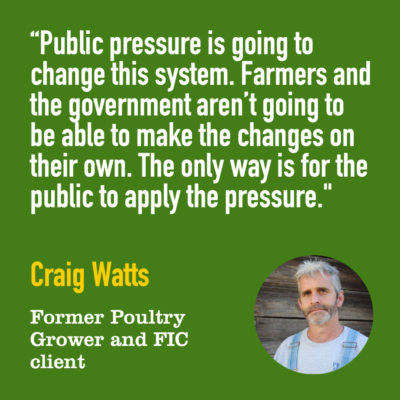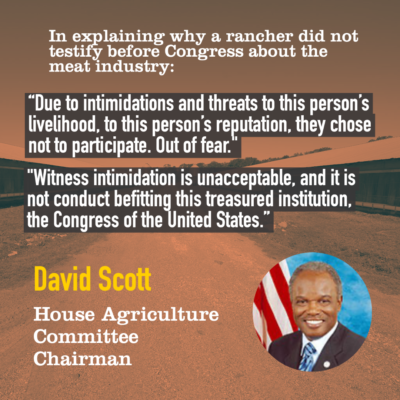← Campaign Page
Powerful corporations exert tremendous pressure to keep farmers quiet which in turn allows systemic wrongdoing to continue unabated. FIC knows all too well the risks whistleblowers take when coming forward. Speaking the truth means more than just putting your job on the line. For farmers, it’s putting your family, friends, and even your home on the line, too.
Here’s what you should know about ongoing and pervasive retaliation against America’s farmers.
Why Farmers Don’t Speak Out and What Keeps Them from Coming Forward
Many factors contribute to why farmers and ranchers do not report wrongdoing. But a decision not to come forward should not suggest that there isn’t a problem. It’s often quite the opposite. Below are some common reasons why whistleblowers stay quiet.
- Problems are Commonly Reported Internally: Contrary to popular belief, most people raise their concerns within their companies. Many farmers report their issues through their chains of command. They await the changes, but with little bargaining power, can do little more than hope and wait that their concerns are addressed.
- Lack of Awareness about Available Rights or Support Available: Unfortunately, farmers have precious little protections when it comes to speaking out against industry wrongdoing. What little protections they do have are often unknown to them.
- Desire for Anonymity: Understandably, given the current climate in the industry, most prefer to make their reports anonymously or through another party.
- Threat of Lawsuits: Farmers working with FIC often voice fears of being sued for speaking out against their integrator. The integrators’ legal might and the threat of retaliatory lawsuits are powerful deterrents to speaking up against wrongdoing. Retaliation against one farmer has a chilling effect on others.
- Association between Severity of Wrongdoing and Scope of Reprisal: In our experience, the greater the wrongdoing the more intense the reprisal. Uncovering one bad apple may lead to little or no retaliation, revealing systemic wrongdoing may come with greater consequences to the truth-teller.
- Bystander Apathy: With so much going wrong, farmers naturally think that someone out there is doing something about it. So often, truth-tellers fail to speak out because they believe that someone or something is working to change the situation.
The Imbalance of Power Between Corporate Behemoths and Farmer Producers
This is a David and Goliath scenario in which farmers are grossly underpowered to address meatpacker giants. When companies have this much power, they can cut corners and bend the rules in their favor, even at the expense of farmers, rural communities, workers, our environment, and eaters. It should not surprise anyone that there are so few farmers who dare to come forward.
What Farmers Risk by Speaking Out
The tactics companies employ to keep whistleblowers silent are brutal. For speaking out, a whistleblower can anticipate such things as negative performance reviews, denials of bonuses, assault, harassment, threats, investigations, increased scrutiny, termination and blocklisting. Commonly, outspoken poultry farmers receive reduced quality of inputs (e.g., sick birds, less/low quality feed and medication). Low quality and/or insufficient inputs mean small paychecks.
Why Everyday People Should Demand an End to Retaliation Against Farmers
Farmers know first-hand what’s going wrong with our food system. If you believe you have a right to know what’s in your food, you should also believe that farmers have the right to tell you the truth. Conscientious and responsible farmers hold big businesses accountable and are in the first and best position to alert us of systemic problems before they cause serious harm. Farmers alert us to abuses of corporate power, threats to public health and animal welfare, and harm to the environment. When farmers feel safe about speaking out against big businesses, it helps you:
- Get a better understanding of how your food is sourced. All that’s inside your food is not always on the label. Your package of chicken may have an illustration of a happy little red barn, but industrial animal production is not a pretty business. The truth is there are unsanitary conditions, disease, pollution to the environment from intensive animal agriculture, and more. Because of consolidation in the industry, if a farmer doesn’t like what his company is doing, the farmer isn’t left with many options, they typically have no other company to farm with.
- Know your food is safe. Farmer Rudy Howell was featured in a VICE article sharing how poultry farms can be breeding grounds for foodborne illnesses like salmonella and campylobacter. He saw the devastating consequences of campylobacter on a young boy who suddenly became completely paralyzed and has long-lasting nerve damage. Because powerful companies keep farmers in the dark, many don’t even know how dangerous food can be. Some farmers realize how important on-farm pathogen control is, but companies aren’t doing anything about it. If a farmer speaks out for the safety of the eating public, that farmer runs the risk of getting terminated like Rudy experienced.
- Ensure the public’s health, even if you don’t eat meat from industrial farms. Farmers warn you about antibiotic resistance and diseases that spread as a result of industrial animal agricultural practices. It is estimated that more than one-half of all available antibiotics are used on animals bred for consumption. Farmers should be able to speak up about the overuse of antibiotics and other routine practices that put all of us at risk of disease spread that could morph into the next pandemic flu and exposure to “superbugs.” Even when farmers know that the company is doing wrong, they are afraid to speak out because doing so only puts the farmer at risk of retaliation.
- Have transparency about animal welfare. 77% of consumers said they are concerned about the welfare of animals raised for food according to a study conducted by the American Society for the Prevention of Cruelty to Animals. Lots of companies are cashing in on advertising claiming their products treat animals humanely. But how do we keep the system honest? You deserve to know how farmed animals are treated: Farmers have told us how companies have changed very little about how animals are treated despite their claims. If you care about animal welfare, then you want farmers to be able to speak the truth.
- Know where your hard-earned food dollars are going. While meatpackers rake in record profits during the pandemic, farmers make less, and you are left paying more at the grocery store. Farmers who complain about their pay or the fairness of their contracts run the risk of losing their contracts all together. That not only puts them in debt, but many farmers mortgage their homes.
- Help rural communities. Powerful companies take advantage of farmers and trap them in one-sided contracts keeping farmers in a cycle of debt. Often relying on government backed loans, companies entice more unwitting farmers to take on extraordinary debt leading to bankruptcies and ultimately decimated rural communities.
- Receive better products in the market. Farmers know that the more information they have, the better decisions they can make for their business. Farmers should be able to participate in producer organizations and associations that fill in the information gap so farmers can be better producers and competitive. Farmers have expressed concern that associations, organizations and the farmers who join them have repeatedly been targets of retaliatory behavior by meat companies.
- Have fair and competitive markets in the meat industry. Farmers and Ranchers should be able to support or participate as witnesses in any proceeding under the Packers and Stockyards Act (to learn more about the Packers and Stockyards act, click here) or a proceeding that relates to an alleged violation of law by a regulated entity. Unfortunately, there are recent examples that we discuss further below, of cattle rancher witnesses who were threatened and intimidated so much that they decided not to testify before Congress on a hearing about cattle markets. The ability to freely participate in these activities without fear of retaliation is essential to promoting fair and competitive markets in the livestock and poultry industries.
Farmers Speaking Up about Retaliation
Rudy Howell
!["Years of being a top producer and never having a single disciplinary action against me, and still [the poultry company] sent me packing for speaking up about the consequences of corporate influence in the food industry. .....I'm not the only farmer they did this to, and there are countless others too afraid to talk for fear the poultry companies will do them the same." -Rudy Howell, Former Poultry Grower and FIC client](https://foodwhistleblower.org/wp-content/uploads/2022/10/Rudy-Howell-Retaliation-quote-1-3-400x400.png)
Long-time Perdue poultry farmer has alleged he was wrongfully discharged for raising concerns about Perdue’s practices. Read his full complaint here. Rudy originally reached out to Government Accountability Project’s Food Integrity Campaign because he was sick of watching the big chicken companies deceptively trap farmers like him into a business that makes it near impossible to stay afloat, and then punish farmers if they don’t do exactly what they’re told.
Rudy’s Story >>
Craig Watts

Craig Watts risked everything so that you could know the truth about the chicken industry. A humble farmer from North Carolina, Craig raised chickens under a Perdue contract for 22 years and became appalled by the company’s practices. He made national headlines in 2014 when he revealed the shocking conditions in which Perdue chickens live, food safety risks, and the company’s misleading animal welfare labels he says “couldn’t be further from the truth.” Craig’s truth-telling effort has paved the way for others to speak out against a system that aims to manipulate, control, and silence farmers.
Craig’s Story >>

Companies are intimidating farmers and ranchers in order to suppress their voices. At two separate Congressional hearings in 2022 to address corporate consolidation and unfair practices in the meat industry, some farmers and ranchers cancelled their decision to testify due to intimidation and fears of retaliation. During the public comment process for the first proposed rule of the Packers and Stockyards Act, a large U.S. chicken company, Mountaire, sent out letters to urge farmers to oppose the new Transparency rule, a rule aimed at improving farmer conditions.
!["Years of being a top producer and never having a single disciplinary action against me, and still [the poultry company] sent me packing for speaking up about the consequences of corporate influence in the food industry. .....I'm not the only farmer they did this to, and there are countless others too afraid to talk for fear the poultry companies will do them the same." -Rudy Howell, Former Poultry Grower and FIC client](https://foodwhistleblower.org/wp-content/uploads/2022/10/Rudy-Howell-Retaliation-quote-1-3-400x400.png)

